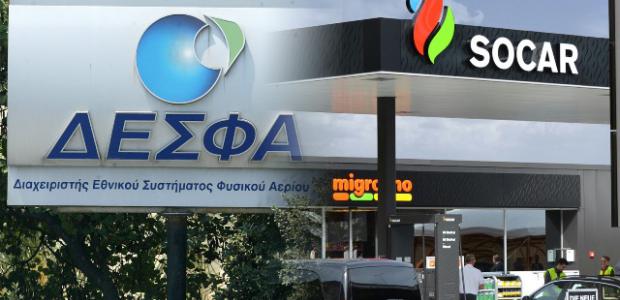The long-running and unfinished sale of a 66 percent share of DESFA, Greece’s natural gas grid operator, to Azerbaijan’s Socar, which will need to surrender 17 percent to a European operator as a result of European Commission intervention, has entered a new stage of stagnancy.
A bailout-related deadline for the establishment of new network usage fees at DESFA, which expires at the end of July, does not seem to have sparked up any sense of urgency.
The energy ministry wants the formula determining the operator’s network usage fees to be revised so that their increase to a higher level remains realistic. The ministry is aiming for a network usage fee hike of about 30 percent, well below a previous plan.
RAE, the Regulatory Authority for Energy, is examining various alternatives but has yet to receive a proposal from DESFA’s administration, which, effectively, will officially launch the revision process. In turn, DESFA is awaiting a green light from the energy ministry, and the energy ministry does not intend to make a move until Socar reaches a final decision on the network usage fees issue.
Though Socar and Italy’s Snam have agreed for the latter to acquire Socar’s surrendered 17 percent, the Azeri firm has not yet emerged for talks with Greece’s energy ministry in order to clarify whether it is willing to accept DESFA’s lower revenue potential, to result from the energy ministry’s demand for a subdued network usage fee hike, and, if so, at what price.
It is believed that the Azeris may break their silence over the next few days. Certain sources contend that both the Greek and Azeri sides are aiming to sink the DESFA sale process, for reasons of their own, without being held directly responsible.
For Greece’s energy minister Panos Skourletis, the sale’s failure would be a success as it would serve his Syriza party line, seeking to maintain as much state control as possible over Greece’s energy networks. An end to the current DESFA plan could lead to an alternative part-privatization along the lines of the plan prepared for IPTO, the power grid operator.
As for the Azeris, who initially entered the DESFA sale primarily to facilitate their wider energy interests, they would like to withdraw as the drastic fall of oil and natural gas prices over the past year-and-a-half has placed great pressure on the company and the energy-dependent Azeri national economy, leading to the need for cost cuts. Even so, Socar is remaining covert about its DESFA intentions as a means of protecting its future energy interests in the wider region.





